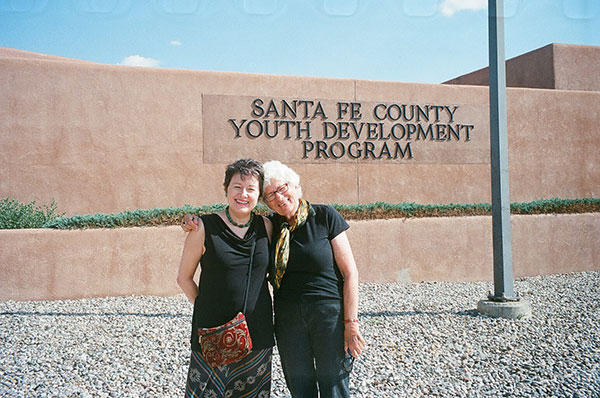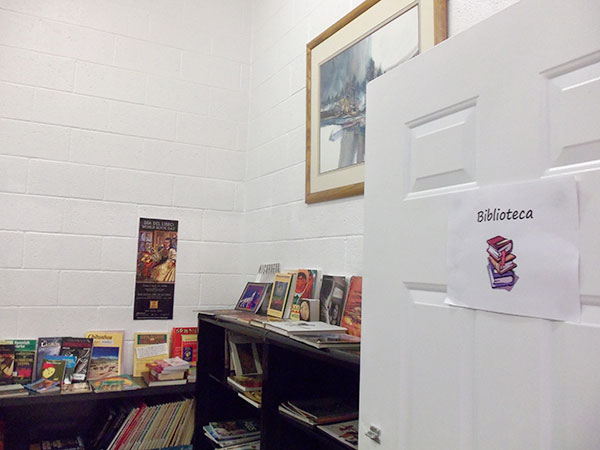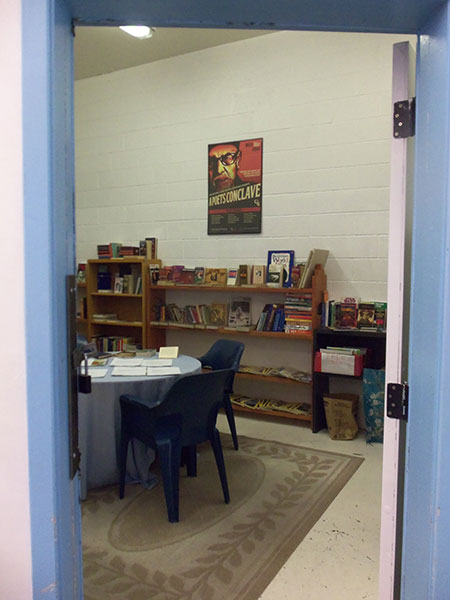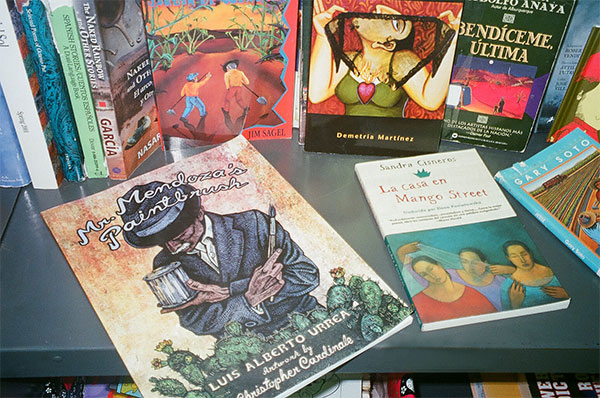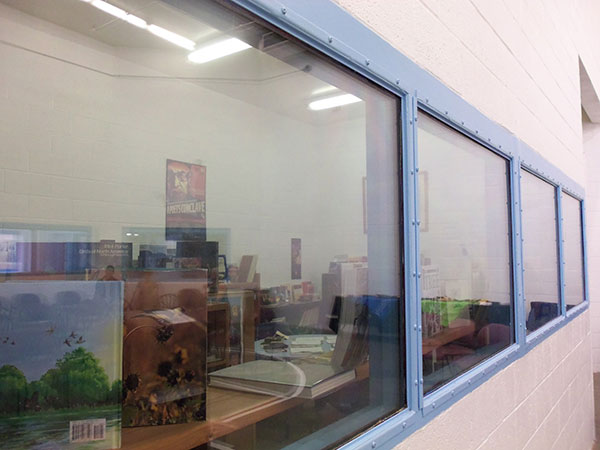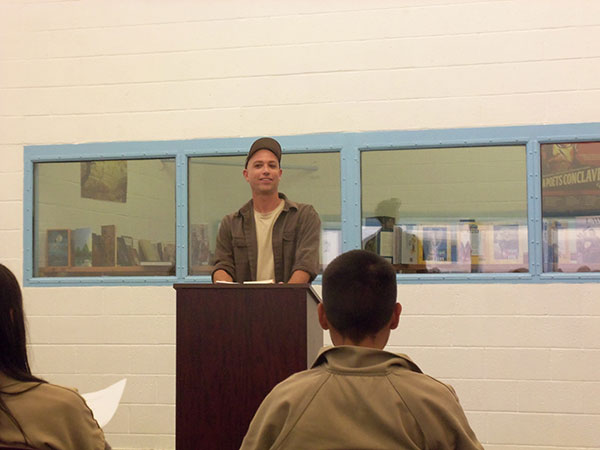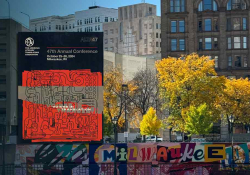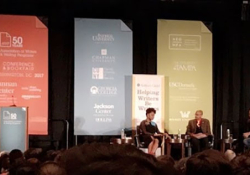The Home of Hope: Biblioteca Amigos Library
For more on Santa Fe’s Biblioteca Amigos Library, read Figueroa's outpost featuring this bilingual literary hub in the November 2014 issue of World Literature Today.
I have read Fahrenheit 451 enough times to know that libraries are one institution that should never be eliminated from a society. Public libraries are hubs of social work. This environment of free and abundant education cannot be anything but an activist agency. For instance, when I see the calendar of my own library offering SAT tutoring, computer classes, and social gatherings, I am imbued with the sense that there is much more going on at libraries than computer games and the shuffling of books. With my already-fervent appreciation of libraries, I was thrilled at the opportunity to get to know the librarians of Biblioteca Amigos Library in Santa Fe, New Mexico.
After Taub had already been contacted by the Santa Fe County Corrections advisory committee to expand the library at the Youth Development Center, Martínez joined the project because of her passion for activism and literature.
Mara Taub and Demetria Martínez are not librarians every day of their lives, but in order for this library to succeed, they had to embody many personas at once. A longtime Coalition for Prisoners’ Rights leader, Taub’s home in Santa Fe is the coalition’s headquarters. A picture of her home appears on its newsletters, along with an inscription: “Despite what everyone envisions as the Coalition, this is our humble home, Hopeland.” Martínez found herself in Hopeland in March when the project began. After Taub had already been contacted by the Santa Fe County Corrections advisory committee to expand the library at the Youth Development Center, Martínez joined the project because of her passion for activism and literature. Though they both knew of each other from Santa Fe’s oddly small-town feel, neither of them had known the other before the project. “I found the spoons right away,” Martínez said. “This place felt like home.” Taub and Martínez found a richly compatible energy. Inspired, they worked off of each other’s genuine enthusiasm to make the residents’ lives better.
This synergy yielded unique results. The library would not have come about in the same way had they not been brought together. Taub was used to sending prisoners her newsletter, and many of them were also sent dictionaries at no cost. When Martínez joined the project, they brainstormed the idea of revamping the YDC library. Speaking to Martínez, Taub said, “You looked at me like I’d offered you a Christmas tree and a birthday cake.” With their commitments solidified, they began working each week to make the library a place for the residents again.
A new library was going to mean many things for the YDC residents, but Taub and Martínez most wished that it would be the chance to give the residents another outlook on their time there. Often times, the prison system emphasizes “reforming” incarcerated persons, and the volunteers did not believe that reform could help these young adults once they left the YDC. Instead, Biblioteca Amigos Library sends a completely different message, which focuses on nurturing and caring for the residents.
For months, the quasi-librarians culled the old books. They wanted to get rid of the ones falling apart and others that were not going to appeal to the residents. Then one day, a friend said, “I have all these books from my high school years that I want to give away.” That was the beginning of their donations. “We have a library with no acquisitions, no check-out policies, and no number control. We just do it and then it works,” Taub said. Their donations have grown to fill all the shelves of the library, but there is still room for more. The volunteers are excited to switch out the books and to offer ones according to themes and holidays.
The small room that houses YDC’s library is shared with a basketball court. The multifunctionality of the room is a perfect setting for the future events that will come from this library and its steadfast volunteers. Taub and Martínez have already brought in speakers to talk to the residents about addiction, college, and planning for their futures when they are released. Other days, nothing but fun is up for discussion. A few future events are going to include visits from a film professional and a soccer player. Many outside volunteers want to offer the residents opportunities to get involved in writing workshops, sports, and career research. The new attention to the YDC always points to the library. It was as if the new work being put into the library aroused an interest in others to share their time with residents. Even the events hosted by the library are inspired by something that everyone can share and take home with them, the insights books hold for us.
Martínez told me a story about one of the young women staying at YDC. She had been in before and was able to read Stephenie Meyer’s Twilight. While this young- adult novel does not appear in the literature section of bookstores, and regardless of its scholarly status, the book had an astounding effect on her. The woman said she had been extremely depressed, but by reading this book she was able to work through her sadness. Martínez assured her that they would scour their donations for more books like Meyer’s.
Some of the books in the library are about serious subject matters such as abuse, poverty, and loneliness. One might argue Taub and Martínez would have been wise to stay on the positive side of literature. However, their move to include more mature works is another attribute of their combined genius. While books that ignite the imagination are in abundance, there are also books that will captivate the residents with characters similar to themselves.
Embracing the various backgrounds of the YDC residents, Taub and Martínez hope that their library will be more than a place of quiet escape.
The library is conscious of the residents’ culture: most speak Spanish and feel at home in this language. The bilingual section even has works of literature translated from languages other than English, such as the story “Todos Somos Uno,” which is a Chinese folktale that has been translated into Spanish. Embracing the various backgrounds of the YDC residents, Taub and Martínez hope that their library will be more than a place of quiet escape. They are thrilled to see the residents taking books with them, knowing that it is appropriate. “It’s a source of inspiration to see these young people walk in, interacting and combing through the books,” Taub said. If the volunteers could have found a way to remember every moment, I believe they would have. They are inspired to work for the residents, and the library gave them the opportunity to hear what the residents need. “As they say in Santa Fe,” Taub said, “‘It was meant.’”
At its most perfect embodiment, a library should be “a place of free speech, community, and controversy,” said Paula Poundstone, an Emmy Award–winning comedian and spokesperson for United for Libraries. Librarians are not prim and passive, as the stereotype suggests. They merge literature and activism in everything they do. This freedom is essential to our understanding of what a library is. Even when certain civil liberties are taken away, the liberty to read should never be tampered with. Biblioteca Amigos Library reflects this vision. It is politically charged, it offers more than books, and it welcomes all. In fact, this library has a lot of Hopeland in it: it’s small and confined, but it transforms itself when the right hands are on it. In this space, the humble home of new hope has begun.
